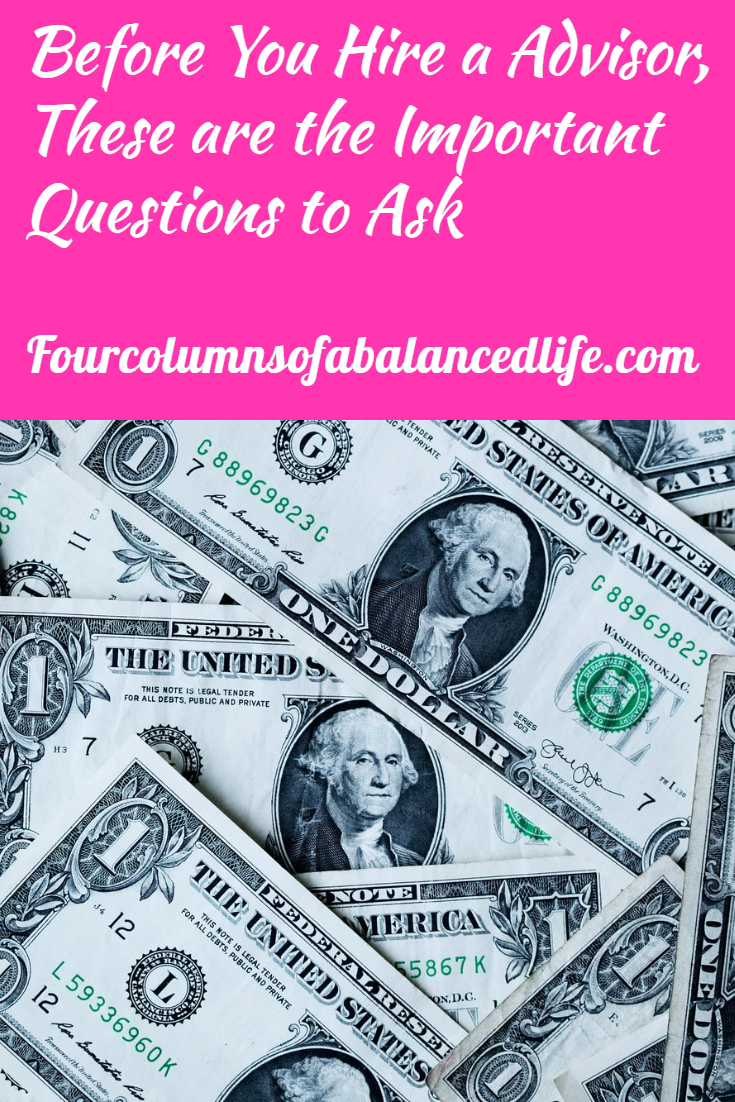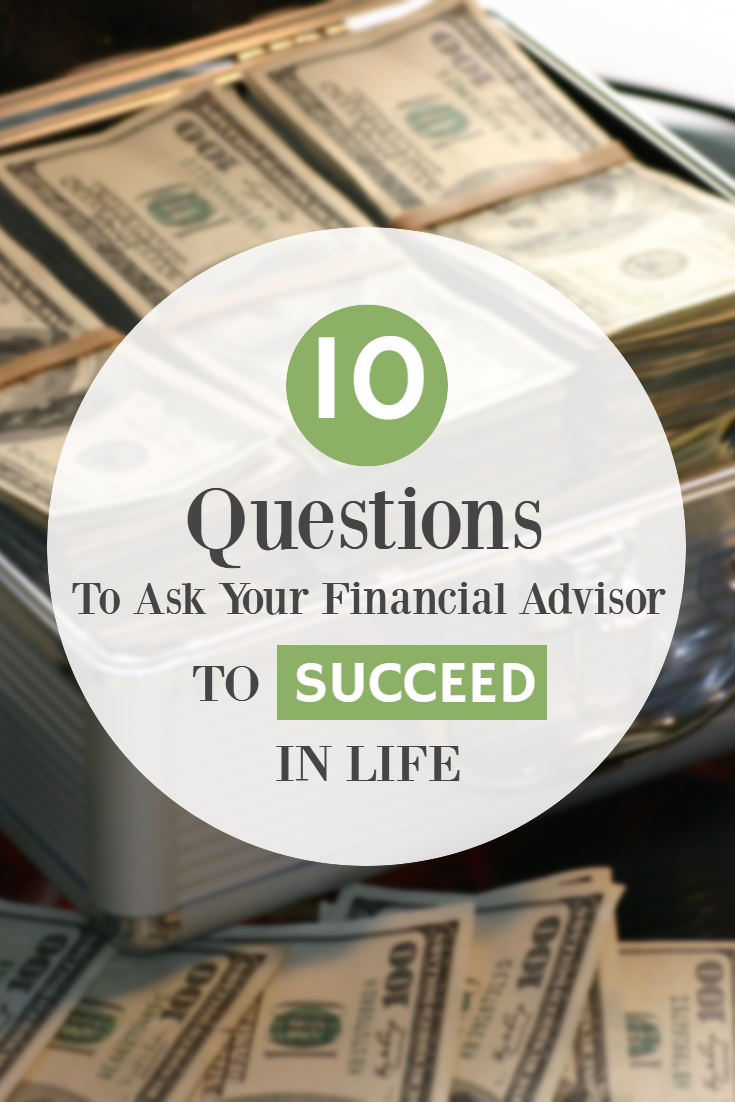10 Questions to Ask Your Financial Advisor

Financial Advisor, Financial Consultant, Financial Planner, Wealth Advisor or a Peddler
In 2019 just before COVID hit I was attending a financial seminar in a mall. The first booth had a bunch of firemen who worked three days on three days off and were selling mutual funds on the side. The next booth was nicely laid out with brochures. The lady was a nanny from 7 am to 3 pm and selling mutual funds was a side hustle. At the third booth was a salesperson who called himself a financial advisor and tried to hire me. He said I could hire other people and make money. Everyone was a mutual fund peddler.
As I walked away from the so-called financial seminar, something hit me. The average public really does not know who or what a financial advisor is. As a financial advisor I had an MBA, financial planning, a trust, and a portfolio manager designation and how does the public know the difference. Do they even know what a financial advisor, financial consultant, or financial planners does?
Everyone is unique and has a different approach towards money. Financial advisors are different, too. It can become challenging to find the right advisor for you to meet your goals, needs and aligned with your values. It is important to find the exact match who will manage your money in a healthy and ethical way. Money can be used to make you happier and make a difference. If you are aware of your goals, priorities, and values then finding the right advisor will make a huge difference.
A financial advisor is more than doing an exam and using the software. It is important for the advisor to be a good listener, have empathy, and guide you through the various financial decisions you will be making during your life. It is a long-term relationship.
Before you look for a financial advisor, I have compiled a few questions to ask, to see if it is the right fit for you. After all, you are giving them your money and savings.

Do not be nervous about interviewing an advisor. You are looking for a ‘cultural fit’. Tell the advisor the first meeting is a ‘getting to know each other’. You will not make a decision in the first meeting. You are hiring someone to take care of your money. The advisor needs to provide a path and not confuse you.
The first thing you need to do is ask yourself what kind of help are you looking for? If you are just starting out and want to invest anywhere from $50 to $500 a month then a robo-advisor will be a great fit for you. Robo-advisors have low fees and do not have a minimum threshold.
Will you have a fiduciary duty towards me?
A fiduciary put their clients’ interest ahead of their own, focusing on preserving good faith and trust. A fiduciary is legally and ethically bound to act in your interest. A non-fiduciary is focusing more on ‘products’ that are ‘suitable’ for you and might not be the best for you.
Talk to me about your education and qualification?
Do not get confused by the alphabet soup of initials behind the name of the financial advisor. The titles of a financial planner, investment advisor, investment executive can be confusing. Look into their background by seeing the professional designation database and the regulatory authority’s website. Check how long they have been in the business and if there are any disciplinary actions, lawsuits against them, or if they are under supervision. A CFP, CFA, or CIM designation is ideal.
You want your advisor to have an understanding of your estate plan, tax plan, insurance and bring a holistic approach to personal finance.
What is your investment philosophy?
The investment advisor is your coach, your guide, and will be an integral part of your financial planning. It is critical to be familiar with the approach they take regarding your investments. What is their approach? What kind of research they do? How do they choose specific stocks, bonds, ETF’s and other investments in your account? Do they strictly buy mutual funds and leave them there? Are they active or passive investors? Will they rebalance your account?
As a client, you have to be on the same page as your advisor. Any advisor will do well in a bull market when everything is going up. How about in a choppy market? The reason it is important to be aligned with your advisor is that what if you do not want to invest in sin stocks? You do not want to invest in an arms manufacturer, alcohol, cigarettes, or gambling companies? However, the advisor presents a portfolio that is full of these companies. Or, you want to invest in companies that focus on corporate social responsibility, ethical and sustainable ideas, invest in women and members of the BIPOC and LGBTQ community.
Investments need to be aligned with your goals and values. It should be diversified. They should have a benchmark that they want to beat. The portfolio recommendations should look at your risk tolerance, investment objectives, cash flow needs, estate goals, age, net worth, and tax situation.
How do you get compensated?
Advisors use per transaction, fee-based or they put you in DSC funds where they get a commission upfront but you have to hold the funds for a certain period. I strongly recommend a fee-based advisor. The fee-based advisor charges a percentage on the assets they manage. They also are not product sellers that give them the greatest commission.
Make sure the advisor is not double-dipping. Make sure the advisor is not charging you fees, then putting you into new issues, private placements, or mutual funds where they get a commission. The advisor should put your needs, goals, values, and investment objectives first.
What experience do you have?
It is vital that you choose a professional who has the experience and who devotes all their time to advice. You want to know how long the advisor has been in the business, how many firms have they changed, and what kind of clients they focus on.
Which custodian do you use?
You do not want a Bernie Madoff happening to you. The advisor needs to have an independent custodian to hold your assets. You want to have online access so you can check your assets.
What services are offered?
A financial advisor might offer financial planning, estate planning, life insurance, stocks, bonds, mutual funds, options, or tax advice depending on their education, credentials, areas of expertise, and registration with regulatory authorities.
I prefer someone who looks at my financial goals, ethics, values and aligns them with investments, insurance, estate planning, and taxation.
Explain how the relationship works between you and your team?
You want to know; will you be talking to the advisor or the assistant. Also, how often will you meet during the year to discuss how the investments are performing. Is it an annual face-to-face meeting? Will you get a weekly or monthly email? Who else is on the team? Is there a lawyer, accountant, or estate specialist also on the team?
Do you work with a special type of client?
Some advisors work only with entrepreneurs, doctors, professional sports players, insiders, executives, or women. You want to know if you fit in that mold? You want to find an advisor who is passionate about helping you meet your goals and has experience working with someone in your financial situation.
Is there a minimum amount that you work with?
You need to find an advisor who will work with what you have. Advisors have a minimum investment for them to take an account. No use going to see an advisor who only takes a million and you have only a hundred thousand to invest.
Does the New Client Application Form detail all the services that will be provided?
The New Client Application Form takes all your information down. Find out if all the services are outlined. Read the fine print.
The next steps in hiring a financial advisor
You have interviewed three advisors. Now it is time to make your decision. Did you like the advisor? Did you bond with the advisor? Can you trust this person? Was there a comfort level? Was the advisor listening to you or just talking over you? If there is a yes to the answers then go ahead and make an appointment. Good luck.


Really helpful info, as we are currently taking a hard look at retirement and investments. Thanks!
I’ve been thinking about hiring a financial advisor for some time now, but don’t know where to start. These questions are really helpful to get the conversation started. Thank you!
I’ve never hired a financial advisor before and didn’t know I’d need to take all of this into consideration. This was an extremely useful article for me. You brought up so many issues that matter to me but I would’ve never thought to bring up in the first meeting.
Thank you for the tips. While I don’t really need a financial advisor now, I may in the future so thank you for sharing your views on this!
This is such a great list of questions. Trust is fundamental. I’ve had the same financial counselor for the past 15 years and I trust her with my life!
Great post…Im sharing! As a CPA I get very frustrated with all the so called financial advisors out there that fail fiduciary duty. So many are totally in it for their own gain and will sell anything to uneducated investors.
Good solid advice. I will be following up with my people and making sure that they address all these questions.
This is such helpful information-I have been thinking about consulting a financial advisor, and now I have some guiding questions!
This is really interesting and useful.
Excellent tips!!! It is important to ask the write questions to see if the advisor is right for you. This certainly will help guide people toward the right advisor.
All great questions. I am a financial professional and I absolutely love when my clients ask these valid questions.